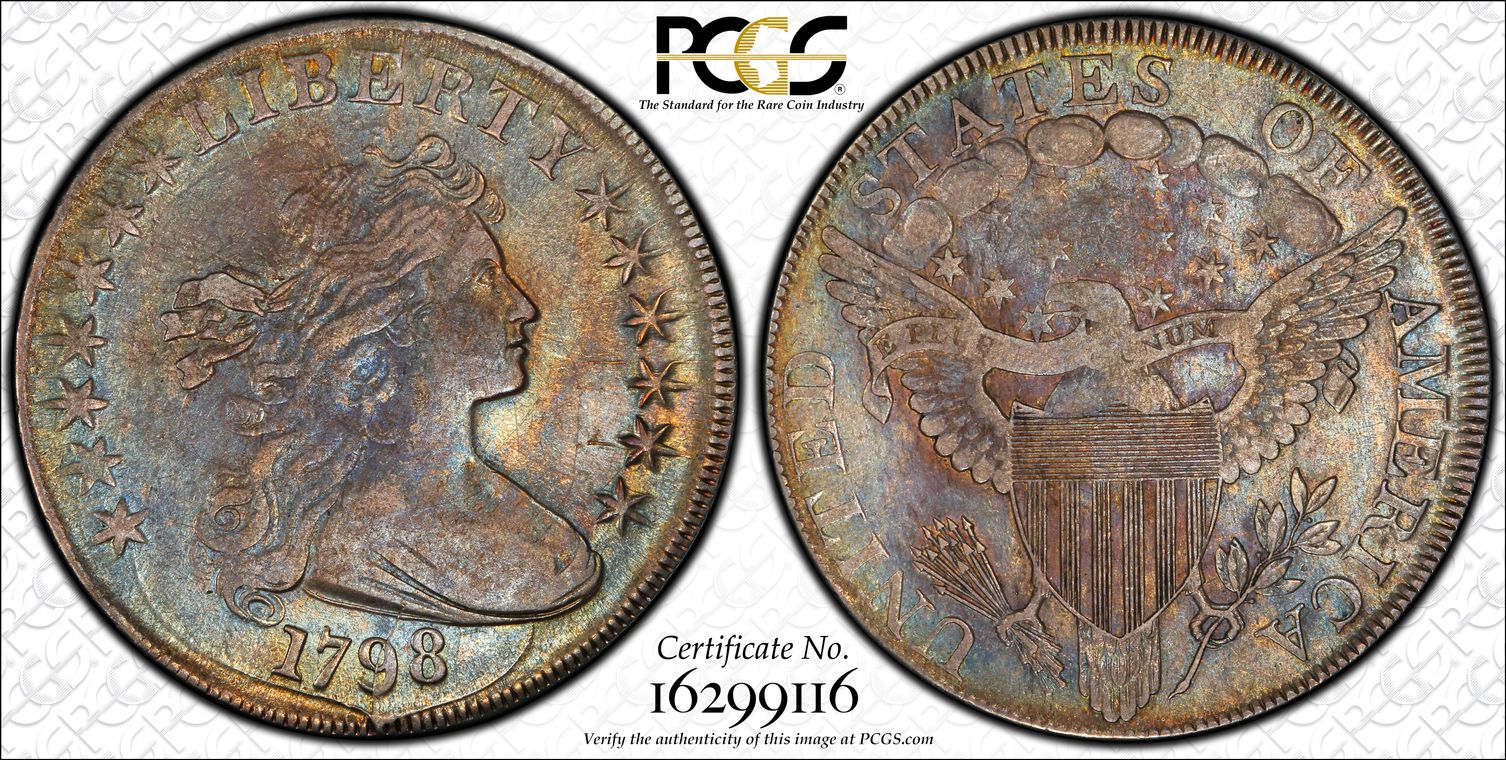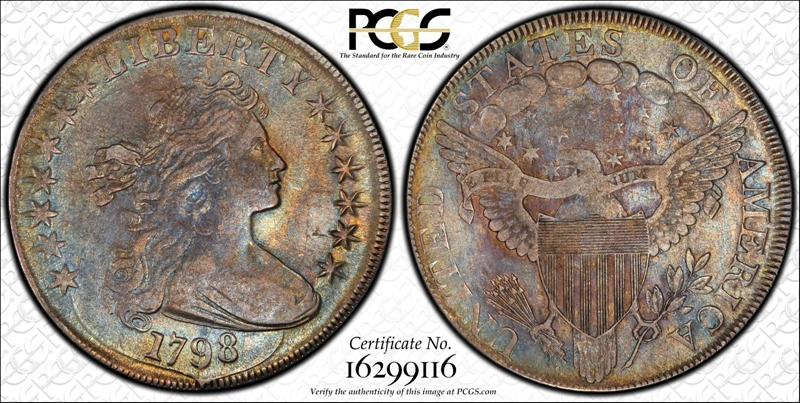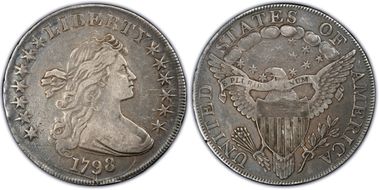1798 $1 BB-119 XF40 认证号16299116, PCGS号40036
拥有者评论
B-29,BB-119. PCGS EF 40. Go back to BB-118 (#16207467) to truly appreciate that great coin. Now we have this obverse die used for the 7th and final time. One can see the deterioration on the right and left side, Stars 1-7 & 8-13. This is better than XF40, great luster and natural color. ?AU50-55, mainly due to strike. R4. Est.Pop.75-150 coins. Much more difficult to find in any grade!
专家评论
Q. David Bowers
The following narrative, with minor editing, is from my "Silver Dollars & Trade Dollars of the United States: A Complete Encyclopedia" (Wolfeboro, NH: Bowers and Merena Galleries, Inc., 1993). Note: the Notable Specimens list should be used with caution - it has been updated in my 2013 edition of "The Encyclopedia of United States Silver Dollars 1794-1804."B-29, H-29
OBVERSE 14: See description under 1798 BB-113. Obverse die used to strike BB-113 (1st use), 1798 BB-114 (2nd use), BB-115 (3rd use), BB-116 (4th use), BB-117 (5th use), BB-118 (6th use), BB-119 (7th and final use).
REVERSE Q: Star touches lower part of eagle's beak; ray points to just left of U in PLURIBUS. Line star pattern. Five small berries, two above closest together. Leaf points under right edge of upright of I in AMERICA. 13 perfect arrows, an unusual situation.
Reverse die used to strike 1798 BB-119 (earlier state) and BB-120 (later state).
DIE STATES:
Die State I: Obverse: Die cracks similar to those on BB-118 but more advanced, now extending across bust into right field. Two short cracks from bust to last star. Additional crack from outside first star through next 3 stars and passing under the 5th, 6th, and 7th stars. The crack splits in two at this point, and both branches continue to the hail'. This variety was struck shortly after BB-118. Reverse from perfect die. The variety usually seen. An AU specimen in the 1975 ANA Convention sale (Superior) had the obverse poorly centered, indicating axial misalignment.
Die State II: Obverse as preceding. Reverse with die crack through UNITED, two leftmost wing tip feathers; and ST, continuing to the top of A and above T. The die state used to strike BB-120.
COLLECTING NOTES: 1798 BB-119 is scarce. Probably about 200 to 350 exist, most of which are in lower grades through VF. EF coins are quite rare, and AU specimens are extremely rare. No Mint State coin has been seen. The one listed was sold in 1970, and may not grade as Uncirculated today.
NOTABLE SPECIMENS:
Hollinbeck-Kagin Specimen. MS-60. Hollinbeck-Kagin, January 1970:783. "Uncirculated golden."
Holmes Specimen. AU-55. Stack's, Milton A. Holmes Collection, 1960:2243. "AU, choice. Full mint lustre and the barest signs of friction on the high points."
Baldenhofer Specimen. AU-50. W.G. Baldenhofer to Stack's, Farish-Baldenhofer Sale, 1955. AJ. Ostheimer, 3rd Collection. Superior Galleries, ANA Convention Sale, 1975:901. "Superficially AU-50, but rubbed on the high points of the obverse. Bluish toning around part of the edges, clean, and partly lustrous. Obverse. very poorly centered,"
Saunders Specimen. EF-45. Bowers and Merena Galleries, Ebenezer Milton Saunders Collection, 1987:3514. "EF-45 or finer. An area of light striking is seen at the upper right of the reverse among the stars and clouds. Mottled medium gray toning."
Lee and Shaffer Collections Specimen. EF-45. Superior Galleries, Lee and Shaffer Collections, 1988:3148. "Extremely late obverse die state with heavy cracks and conspicuous weakness of strike at the left border. Sharpness of EF-45, but attractively toned. A few small marks."
Four Landmark Collections Specimen. EF-45. Bowers and Merena Galleries, Four Landmark Collections, 1989:1961. "EF-45 to AU-50. Pale silver gray and. darker mottled gray on the obverse, dark gray and mottled golden brown on the reverse. Mint lustre may be seen across much of the obverse surface, and beneath the toning on the reverse. Rather later state of the obverse die than that usually seen, with the trident shaped cracks rising from below the date here enlarged and strong, together with numerous subsidiary cracks at the top and right portion of the die. Clearly, this obverse could not long have continued in use before completely failing."
Boyd Specimen. EF-40. Numismatic Gallery, World's Greatest Collection, F.C.C. Boyd, 1945:56. "EF."
GENA Convention Sale .Specimen, EF-40. Lester Merkin, 1972:850. "Mostly well struck, developing warm gray tone."
PCGS #
40036
设计师
Robert Scot
边缘
Lettered: HUNDRED CENTS ONE DOLLAR OR UNIT
直径
40.00 毫米
重量
27.00 克
铸币数量
287536
金属成分
90% Silver, 10% Copper
更高评级数量
2
评级较低的钱币数量
11
地区
The United States of America
价格指南
PCGS 数量报告
拍卖 - PCGS 评级的
拍卖 - NGC 评级的


























